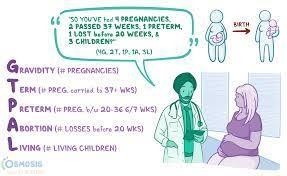A nurse in a prenatal clinic is caring for a client who is at 39 weeks of gestation and who asks about the signs that precede the onset of labor. Which of the following should the nurse identify as a sign that precedes labor?
A surge of energy
Urinary retention
Decreased vaginal discharge
Weight gain of 0.5 to 1.5 kg
The Correct Answer is A
A. A surge of energy: Some women experience a sudden burst of energy, often referred to as a "nesting" instinct, shortly before the onset of labor.
B. Urinary retention: Urinary frequency and urgency are more common before labor, not urinary retention.
C. Decreased vaginal discharge: Before labor, there might be an increase in vaginal discharge, often thick and pinkish, known as the "bloody show."
D. Weight gain of 0.5 to 1.5 kg: Weight gain is not typically associated with the onset of labor.
Nursing Test Bank
Naxlex Comprehensive Predictor Exams
Related Questions
Correct Answer is C
Explanation
The correct answer is: c. 42022
Choice A: 40122
Reason: This choice is incorrect because it indicates 4 pregnancies (correct), 0 term births (correct), 1 preterm birth (correct), 2 abortions (correct), but 2 living children (incorrect). The client has 2 living children, which is correct, but the term and preterm counts are not accurate.
Choice B: 20020
Reason: This choice is incorrect because it indicates 2 pregnancies (incorrect), 0 term births (correct), 0 preterm births (incorrect), 2 abortions (correct), and 0 living children (incorrect). The client has had 4 pregnancies, 1 preterm birth, and 2 living children.
Choice C: 42022
Reason: This choice is correct. It indicates 4 pregnancies (current pregnancy, elective abortion, twins, spontaneous abortion), 0 term births, 2 preterm births (twins at 36 weeks), 2 abortions (elective at 9 weeks, spontaneous at 15 weeks), and 2 living children (twins).
Choice D:
The GTPAL system is used to assess a client's obstetric history:
- G (Gravida): The total number of pregnancies, including the current one.
- T (Term births): The number of pregnancies carried to at least 37 weeks.
- P (Preterm births): The number of pregnancies delivered between 20 and 36 weeks, 6 days.
- A (Abortions): The number of pregnancies ending before 20 weeks (spontaneous or elective).
- L (Living children): The number of children currently alive.
For this client:
G (Gravida): 4 (one elective abortion, one twin pregnancy, one spontaneous abortion, and the current pregnancy).
- T (Term births): 0 (the twin pregnancy was delivered at 36 weeks, which is preterm).
- P (Preterm births): 1 (twins delivered at 36 weeks count as one preterm birth).
- A (Abortions): 2 (one elective abortion at 9 weeks, one spontaneous abortion at 15 weeks).
- L (Living children): 2 (the twins).
Thus, the GTPAL for this client is 4-0-1-2-2.

Correct Answer is A
Explanation
Choice A: The client should not lie on her back during the NST because the supine position can compress the vena cava and reduce blood flow to the placenta and the baby. The NST is typically done with the client in a semireclined or left lateral position to ensure optimal blood flow to the baby.
Choice B: Monitoring the baby's heart rate is a correct statement and a standard part of the NST procedure.
Choice C: The duration mentioned (20 to 30 minutes) is accurate for the average NST timeframe.
Choice D: Scheduling the NST when the baby is usually active is also a correct statement, as fetal movement during the test is an important aspect of evaluating fetal wellbeing.
Whether you are a student looking to ace your exams or a practicing nurse seeking to enhance your expertise , our nursing education contents will empower you with the confidence and competence to make a difference in the lives of patients and become a respected leader in the healthcare field.
Visit Naxlex, invest in your future and unlock endless possibilities with our unparalleled nursing education contents today
Report Wrong Answer on the Current Question
Do you disagree with the answer? If yes, what is your expected answer? Explain.
Kindly be descriptive with the issue you are facing.
